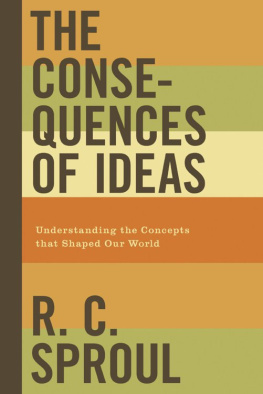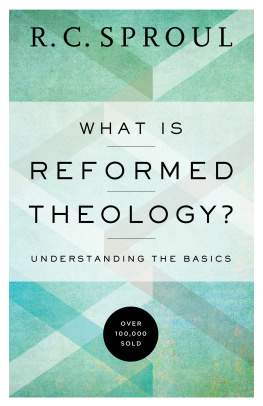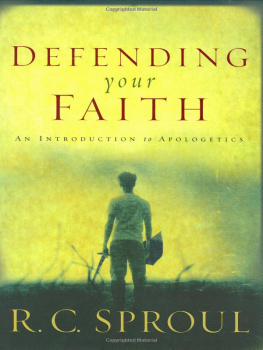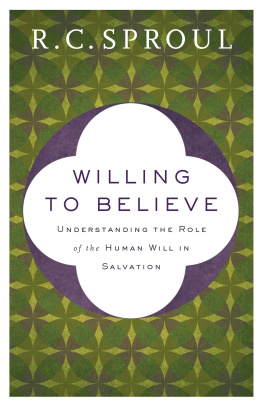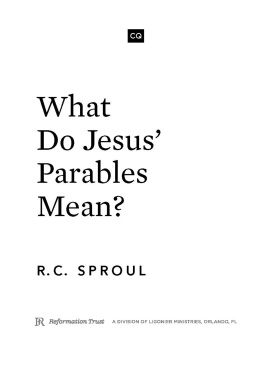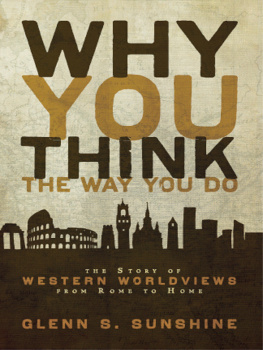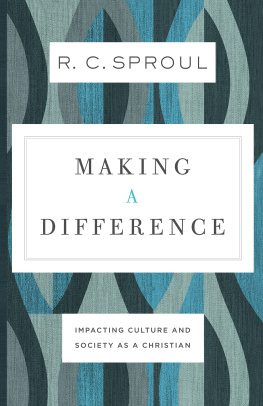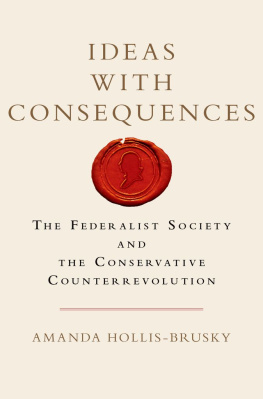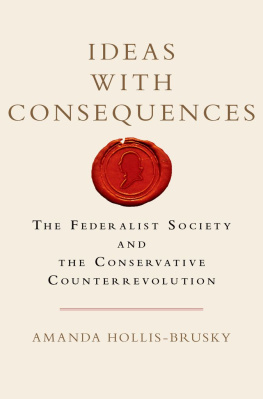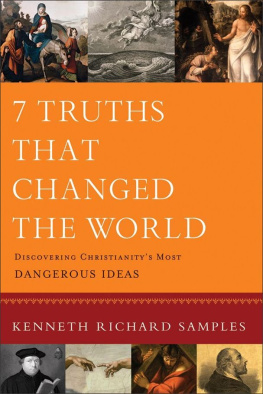THE CONSEQUENCES OF IDEAS

The Consequences of Ideas
Copyright 2000 by R. C. Sproul
Published by Crossway Books
a publishing ministry of Good News Publishers
1300 Crescent Street
Wheaton, Illinois 60187
All rights reserved. No part of this publication may be reproduced, stored in a retrieval system, or transmitted in any form by any means, electronic, mechanical, photocopy, recording, or otherwise, without the prior permission of the publisher, except as provided by USA copyright law.
Cover design: Jon McGrath
First printing 2000
First trade paperback printing 2009
Printed in the United States of America
Unless marked otherwise, Scripture references are from the New King James Version. Copyright 1982, Thomas Nelson, Inc. Used by permission.
The Scripture reference marked KJV is from the King James Version.
Trade paperback ISBN: 978-1-4335-0314-6
PDF ISBN: 978-1-4335-1161-5
Mobipocket ISBN: 978-1-4335-1162-2
Library of Congress Cataloging-in-Publication Data
Sproul, R. C. (Robert Charles), 1939
The consequences of ideas : understanding the concepts that shaped
our world / R. C. Sproul.
p. cm.
Includes bibliographical references and index.
ISBN 13: 978-1-58134-172-0 (hardcover : alk. paper)
ISBN 10: 1-58134-172-5
1. PhilosophyHistory. 2. ChristianityPhilosophy. I. Title.
B72. S68 2000
190dc21
00-008637
VP 17 16 15 14 13 12 11 10 09
12 11 10 9 8 7 6 5 4 3 2 1
CONTENTS
FIGURES
TABLES
The summer of 1959: This date marked the end of my sophomore year in college and the tail end of the decade of Happy Days. The beloved Ike still occupied the Oval Office, the New York Yankees still dominated major-league baseball, and the turbulent decade of the Sixties was still a year away.
My biggest concern was summer employment. Many friends who were engineering students had found lucrative summer jobs that paid well above the minimum wage. My prospects were bleak: I was a philosophy major. I did not find in the newspaper a single want ad calling for philosophers. My only real option was a job for unskilled labor paying the minimum wage. Even at that I was delighted to be offered work in the maintenance department of a hospital.
When the foreman heard I was a philosophy major, he handed me a broom and said, Here, you can think all you want while youre leaning on the broom. My coworkers enjoyed this calumny. Among other responsibilities, I was to sweep the hospitals driveway and parking area.
During my first week on the job, I was reaching the end of my sweeping territory. My zone ended where the main hospital driveway intersected the parking lot of the nurses home. I noticed another man sweeping the adjacent parking lot. He greeted me, and we exchanged names and pleasantries. When I told him I was a college student, he asked what I was studying. When I said philosophy, his face brightened and his eyes lit up. He fired a barrage of questions at me, inquiring about Descartes, Plato, Hegel, Kant, Kierkegaard, and others. I was astonished at this mans knowledge. He obviously knew far more about philosophy than I did.
Dangerous Thoughts
I thought it bizarre that an adult whose chief occupation is to sweep driveways could be so erudite in the abstract field of philosophy. The whole conversation seemed incongruous to me. I had to ask him how he knew so much about philosophy. His story was heart-wrenching.
My new friend was from Germany. He had his Ph.D. in philosophy and had been a professor of philosophy in Berlin. When Adolf Hitler came to power, the Nazis were not content to find a final solution for Jews and Gypsies. They also sought to eliminate intellectuals whose ideas were at odds with the values of the Third Reich. My friend was removed from his position. When he spoke out against the Nazis, his wife and all but one of his children were arrested and executed. He escaped from Germany with his young daughter.
When I asked why he was no longer teaching, he said that teaching philosophy had destroyed the lives of his loved ones and ruined his own. With tears in his eyes, he said he now lived only for his daughter.
When I heard this mans story, I was twenty years old. To me World War II was a dim memory. To a twenty-year-old, fourteen years seem like an eternity. But to my German friend, who was in his mid-fifties, the war years seemed like yesterday. His memory of the past was by no means dim.
I mused on something else that morning, which is why I am recounting the tale here. I was pushing a broom because I lived in a culture that sees little value in philosophy and gives scant esteem to those who pursue it. My friend was pushing a broom, on the other hand, because he came from a culture that gave great weight to philosophy. His family was destroyed because Hitler understood that ideas are dangerous. Hitler so feared the consequences of my friends ideas that he did everything possible to eliminate himand his ideas.
As you read this book, you probably are not outside reading by sunlight or inside reading by candlelight. More likely you are reading in a room illumined by artificial light. Where did that light come from? You probably got to where you are right now by automobile. Where did that car come from? There is probably no outhouse behind your kitchen. Your place of residence probably has running water and indoor plumbing. Where did that come from?
I ask about things that were virtually unknown just a century ago, but that we now consider essential elements of everyday living. These practical things are there because someone first thought about them (perhaps while leaning on a broom) before they were invented or brought into existence. The idea preceded the product, which is how it usually works.
Not all ideas issue in tangible products. Some ideas are harebrained. Yet even a dreamers fanciful ideas often become honed into sharp concepts with massive consequences.
Foundational Thoughts
Philosophy forces us to think foundationally. By foundational I mean first principles or basic truths. Most ideas that shape our lives are accepted (at least initially) somewhat uncritically. We do not create a world or environment from scratch and then live in it. Rather we step into a world and culture that already exists, and we learn to interact with it.
For example, few people today debate the virtues of a graduated or progressive income tax, in which one group pays not only more money but also a higher percentage of their income (how unlike the titheGods flat tax!). Rarely does anyone challenge the justness of such a scheme, because it has been in force for so long. It is an accepted reality. When enacted, however, it was the focus of fierce controversy.
Nor do we find much deep discussion about political or legal theory, such as marked the Enlightenment. Then, when the structure of monarchy was giving way to new forms of government, people focused on foundational theory. But today (except perhaps during impeachment trials) we rarely hear discussions of the difference between a republic and a democracy. Nor do we hear loud controversies about the foundation for law (save when Supreme Court-justice nominee Clarence Thomas alluded to natural law during his confirmation hearing and Senator Joseph Biden responded with a heated retort).
Our countrys Constitution was established more than 200 years ago. This idea has already been implemented. Today we merely tweak it with new legislation here and a new judicial decision there. Never mind that we have tweaked the original beyond recognition and are in danger of being pecked to death by baby ducks.
We step into the game long after the game was conceived. The rules have been decided and the boundaries set. We are amused when Descartes labors so long and thinks so deeply in order to conclude that he exists. We think it is funny; we think it a foolish waste of time to prove something we all know is truethat we exist. Or we are puzzled by Kants spending his life analyzing how we know anything that we know, when from our vantage point we simply know it.
Next page
